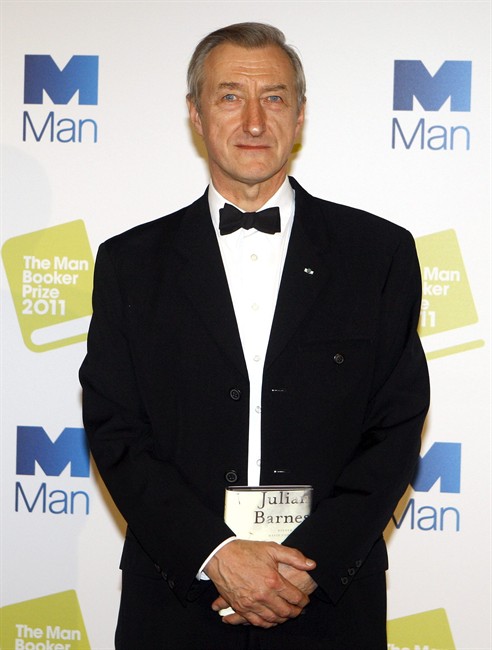‘The Sense of an Ending’ by Julian Barnes wins Booker Prize for fiction
Advertisement
Read this article for free:
or
Already have an account? Log in here »
To continue reading, please subscribe:
Monthly Digital Subscription
$1 per week for 24 weeks*
- Enjoy unlimited reading on winnipegfreepress.com
- Read the E-Edition, our digital replica newspaper
- Access News Break, our award-winning app
- Play interactive puzzles
*Billed as $4.00 plus GST every four weeks. After 24 weeks, price increases to the regular rate of $19.00 plus GST every four weeks. Offer available to new and qualified returning subscribers only. Cancel any time.
Monthly Digital Subscription
$4.75/week*
- Enjoy unlimited reading on winnipegfreepress.com
- Read the E-Edition, our digital replica newspaper
- Access News Break, our award-winning app
- Play interactive puzzles
*Billed as $19 plus GST every four weeks. Cancel any time.
To continue reading, please subscribe:
Add Winnipeg Free Press access to your Brandon Sun subscription for only
$1 for the first 4 weeks*
*$1 will be added to your next bill. After your 4 weeks access is complete your rate will increase by $0.00 a X percent off the regular rate.
Read unlimited articles for free today:
or
Already have an account? Log in here »
Hey there, time traveller!
This article was published 18/10/2011 (5071 days ago), so information in it may no longer be current.
LONDON – It was fourth time lucky for British writer Julian Barnes, who won literature’s Booker Prize on Tuesday after a contest that had as many insults, rivalries and bitter accusations as a paperback potboiler.
Barnes, who has been a finalist three times before but has never won, beat British writers Stephen Kelman and Carol Birch and two Canadians: Victoria-based Esi Edugyan and Vancouver Island native Patrick deWitt.
Both Edugyan and deWitt are also up for the Rogers Writers’ Trust Fiction Prize, the Scotiabank Giller Prize and the Governor General’s Literary Award.

Barnes, who once described the contest as “posh bingo,” finally triumphed with “The Sense of an Ending,” a memory-haunted novel about a 60-something man forced to confront buried truths about his past after the unexpected arrival of a letter.
Former British spy chief Stella Rimington, who chaired the judging panel, said the 150-page novel “spoke to the humankind in the 21st century.”
Barnes, one of Britain’s most critically acclaimed novelists, was previously nominated for “Flaubert’s Parrot,” ”England, England” and “Arthur and George.” The 65-year-old writer conceded that “in occasional moments of mild paranoia” he had wondered if forces were working against him ever winning.
“I’m as much relieved as I am delighted to receive the 2011 Booker Prize,” he said.
Barnes had been the strong favourite to win 50,000 pound (US$82,000) award, attracting half of all bets laid through bookmaker William Hill.
One of the English-speaking world’s most high-profile literary prizes, the Booker is open to writers from Britain, Ireland and the 54-nation Commonwealth of former British colonies. Founded in 1969, it is officially called the Man Booker Prize after its sponsor, financial services conglomerate Man Group PLC.
It always attracts colorful commentary and controversy, but this year’s has been particularly combative, with critics accusing the five judges of dumbing-down after Rimington said the finalists had been chosen for readability.
The shortlist drew criticism for excluding some of the year’s most critically lauded books, including “On Canaan’s Side” by Ireland’s Sebastian Barry and “The Stranger’s Child” by Britain’s Alan Hollinghurst.
And a group of writers, publishers and agents announced it was setting up a rival award that hopes to supplant the Booker as English literature’s premier prize.
Literary agent Andrew Kidd, spokesman for the new Literature Prize, said the goal was to create an award “where the single criterion is excellence rather than other factors.”
The new prize will be open to any English-language writer whose work has been published in Britain — unlike the Booker, which does not allow American entrants.
On Tuesday, Rimington accused the Booker’s critics of patronizing and insulting both authors and judges.
She said the judges were pleased that the batch of six finalists was the bestselling in Booker history. Though only Barnes was an A-list literary name, the novels’ pacy plots and varied settings — from Gold Rush-era America to 19th-century London to prewar Berlin — have appealed to readers.
“I thought that the intelligence world was the place for intrigue,” said Rimington, former director of the MI5 spy agency. “But that was before I met the publishing world.”
___
Online: http://www.themanbookerprize.com/
___
Cassandra Vinograd contributed to this report. Jill Lawless can be reached at: http://twitter.com/JillLawless

